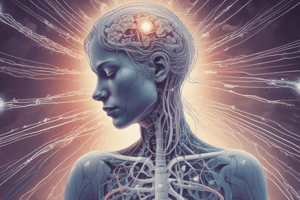Podcast
Questions and Answers
Which of the following is a cognitive barrier to pain relief?
Which of the following is a cognitive barrier to pain relief?
- Lack of understanding about pain and its management (correct)
- Belief that pain is a necessary part of the healing process
- Fear of addiction or dependence on pain medications
- History of trauma or abuse
What is an emotional and psychological distress that can be a barrier to pain relief?
What is an emotional and psychological distress that can be a barrier to pain relief?
- Belief that pain is a necessary part of the healing process
- Fear of addiction or dependence on pain medications
- Lack of understanding about pain and its management
- Presence of depression, anxiety, or PTSD (correct)
What is a belief that can be a barrier to pain relief?
What is a belief that can be a barrier to pain relief?
- Belief that pain is a normal part of life
- Belief that pain can be overcome through willpower alone (correct)
- Belief that pain is a sign of weakness
- Belief that pain medications are ineffective
What is an example of a cognitive barrier to pain relief related to unrealistic expectations?
What is an example of a cognitive barrier to pain relief related to unrealistic expectations?
What is a psychological barrier to pain relief due to concerns about medication?
What is a psychological barrier to pain relief due to concerns about medication?
Which of the following is a physical barrier to pain relief due to difficulty in communication?
Which of the following is a physical barrier to pain relief due to difficulty in communication?
What is a psychological barrier to pain relief related to negative emotions?
What is a psychological barrier to pain relief related to negative emotions?
Which of the following is a physical barrier to pain relief due to the presence of medical devices?
Which of the following is a physical barrier to pain relief due to the presence of medical devices?
What is a psychological barrier to pain relief related to societal attitudes?
What is a psychological barrier to pain relief related to societal attitudes?
Which of the following is a physical barrier to pain relief due to a medical condition?
Which of the following is a physical barrier to pain relief due to a medical condition?
Study Notes
Psychological Barriers to Pain Relief
Fear and Anxiety
- Fear of addiction or dependence on pain medications
- Fear of side effects or adverse reactions
- Anxiety about the underlying cause of pain or diagnosis
- Fear of losing control or autonomy
Beliefs and Attitudes
- Belief that pain is a necessary part of the healing process
- Belief that pain is a sign of weakness
- Attitudes towards pain medication, such as viewing it as a last resort
- Belief that pain can be overcome through willpower alone
Emotional and Psychological Distress
- Presence of depression, anxiety, or post-traumatic stress disorder (PTSD)
- History of trauma or abuse
- Emotional distress or dysphoria
- Sleep disturbances or fatigue
Cognitive Barriers
- Lack of understanding about pain and its management
- Unrealistic expectations about pain relief
- Misconceptions about pain medications or treatment options
- Difficulty communicating pain experiences or needs
Personality Traits
- High levels of catastrophizing or magnification
- Low levels of self-efficacy or coping skills
- Presence of anxiety sensitivity or fear of pain
- Avoidance behaviors or coping mechanisms
Psychological Barriers to Pain Relief
Fear and Anxiety
- Fear of addiction to pain medications contributes to psychological barriers to pain relief
- Fear of side effects or adverse reactions to pain medications is a common anxiety
- Anxiety about the underlying cause of pain or diagnosis affects pain management
- Fear of losing control or autonomy is a psychological barrier to pain relief
Beliefs and Attitudes
- Believing pain is necessary for healing hinders pain relief efforts
- Viewing pain as a sign of weakness affects attitudes towards pain management
- Some people view pain medication as a last resort, hindering effective pain relief
- Believing pain can be overcome through willpower alone is a barrier to seeking medical help
Emotional and Psychological Distress
- Depression, anxiety, and PTSD can exacerbate pain and hinder relief efforts
- History of trauma or abuse contributes to emotional distress and affects pain management
- Emotional distress and dysphoria can worsen pain experiences
- Sleep disturbances and fatigue can result from unmanaged pain
Cognitive Barriers
- Lack of understanding about pain and its management hinders effective relief
- Unrealistic expectations about pain relief can lead to disappointment
- Misconceptions about pain medications or treatment options affect pain management
- Difficulty communicating pain experiences or needs with healthcare providers is a barrier to effective pain relief
Personality Traits
- High levels of catastrophizing or magnification of pain worsen pain experiences
- Low levels of self-efficacy or coping skills affect pain management
- Anxiety sensitivity or fear of pain contributes to psychological barriers
- Avoidance behaviors or coping mechanisms hinder effective pain relief
Pharmacological Barriers to Pain Relief
Tolerance and Dependence
- Tolerance occurs when the same dose of a drug becomes less effective over time, requiring increased doses to achieve the same level of pain relief.
- Dependence is a physical or psychological need for the drug to feel normal, and can lead to addiction.
Pharmacokinetic Barriers
- Absorption barriers can occur when the drug is not absorbed properly from the site of administration, resulting in reduced efficacy.
- Distribution barriers can lead to unequal distribution of the drug throughout the body, affecting its effectiveness.
- Metabolism barriers can cause the drug to be broken down too quickly, reducing its duration of action.
- Elimination barriers can result in the drug being excreted too quickly, reducing its effectiveness.
Pharmacodynamic Barriers
- Receptor down-regulation can lead to decreased sensitivity of pain receptors to the drug, reducing its effectiveness.
- Receptor desensitization can cause the receptors to become less responsive to the drug, reducing its effectiveness.
- Compensatory mechanisms can activate opposing physiological processes that counteract the drug's effects, reducing its effectiveness.
Interactions with Other Medications
- Drug-drug interactions can alter the efficacy or increase the toxicity of the drug when taken concurrently with other medications.
- Polypharmacy can increase the risk of adverse effects when taking multiple medications.
Genetic Variability
- Genetic polymorphisms can affect how an individual metabolizes and responds to a drug, leading to variable efficacy.
- Pharmacogenomics is the study of how genetic factors affect an individual's response to a drug, helping to tailor treatment to individual needs.
Barriers to Pain Relief
Psychological Barriers
- Fear of addiction, the unknown, and diagnosis/treatment anxiety can lead to underreporting of pain and medication reluctance.
- Patients may downplay or deny their pain, resulting in inadequate treatment.
- Stigma associated with opioid medications or chronic pain conditions can prevent patients from seeking or adhering to treatment.
- Cognitive impairment or dementia can hinder effective pain communication.
- Cultural and language differences can create barriers to pain assessment and treatment.
Physical Barriers
- Impaired vision, hearing, or speech can hinder pain communication.
- Cognitive impairment or dementia can make it difficult for patients to communicate their pain effectively.
- Physical disabilities, such as paralysis or amputation, can make it difficult for patients to communicate their pain or take medication.
- Invasive medical devices, such as ventilators or dialysis machines, can create barriers to effective pain assessment and treatment.
- Comorbidities, such as respiratory or cardiovascular disease, can make it difficult to manage pain effectively.
Studying That Suits You
Use AI to generate personalized quizzes and flashcards to suit your learning preferences.
Description
Explore the psychological factors that can hinder effective pain management, including fear, anxiety, beliefs, and attitudes.




